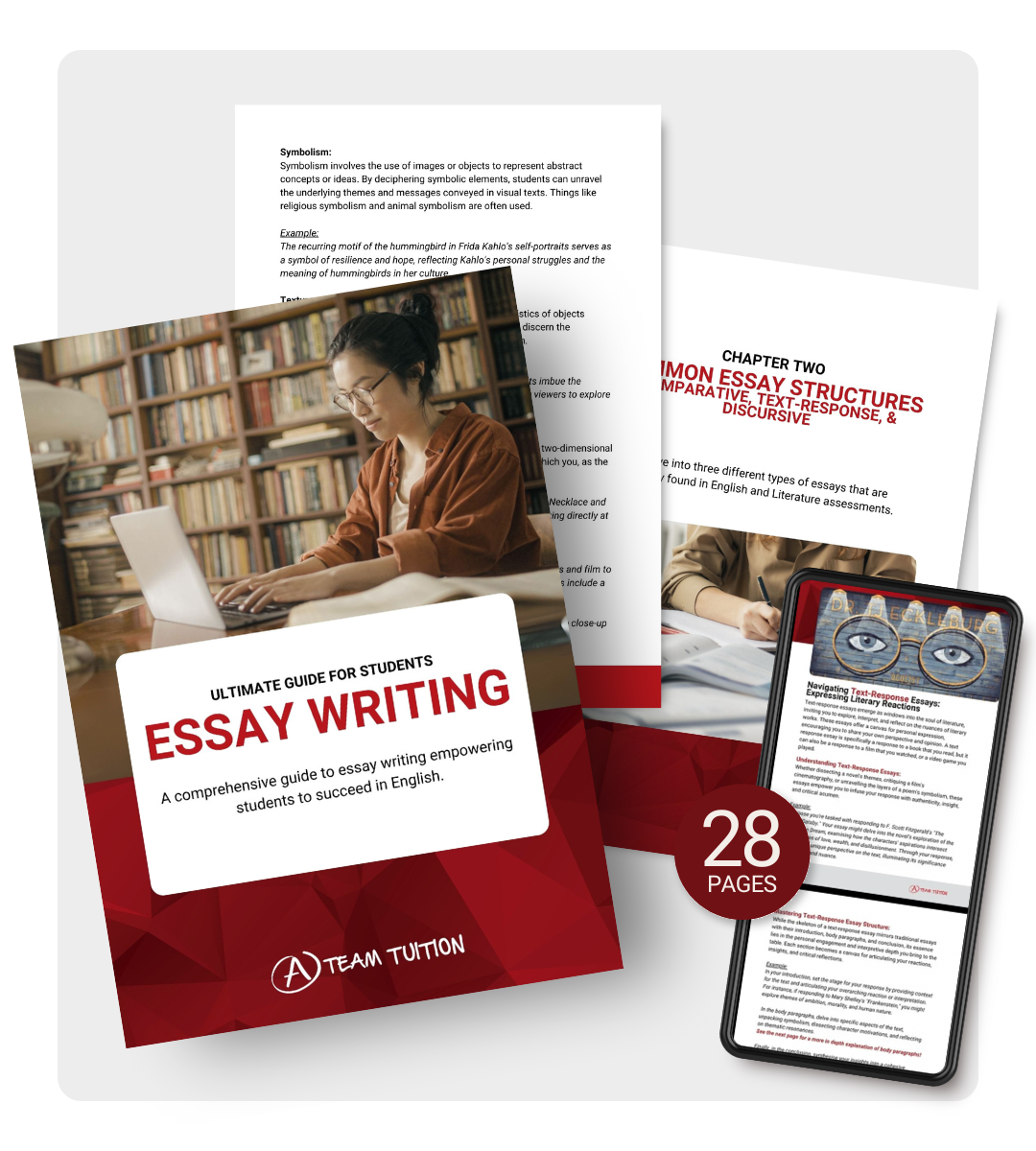How To Write an Impressive English Essay: 4 Simple Steps to Better Writing
As a high school student, you might wonder why English essay writing is so important, or you might find it difficult to get started. Whilst English essays might sometimes feel pointless, they are a good skill to learn. Essay writing enables you to build your confidence in formal writing, develop your own voice, and develop your ability to present arguments from different points of view clearly.
Now that you know the importance of knowing how to write an English Essay, you must be wondering where to begin. Writing an English essay, especially a good one, can seem daunting at first. Thankfully there is a super simple formula: every English essay must have an introduction, body paragraphs, and a conclusion. Let’s get into it further.

Step 1: Before you start writing an English Essay
To get an A in English you need to understand that there is a structure, and having a plan is the essay structure’s greatest ally. You may think that planning an essay isn’t all that influential and you could just ‘wing it’? This, however, is a mistake that many students have made in the past that can easily be avoided!
A good place to start is to have a firm understanding of your topic/question by conducting research and a detailed outline to organise your thoughts. Outline templates are even available online to help get you started, should you find yourself struggling to get you started.
Step 2: How to Write an Introduction to an English Essay
Now that you have a plan outlined for your essay, you can begin to write! An introduction to an English Essay has critical elements including a hook, background information, and a thesis statement.
What is a hook?
The hook of your essay draws your audience in. It is a sentence designed to get your audience interested in your topic and to continue reading.
For example, imagine you’re mindlessly scrolling online until you spot an article and see only the first sentence. Why is that? Because the hook tells you if it is even worth stopping to read.
What is background information?
Background information in an English Essay introduction is just as significant as the hook. It’s what introduces your topic to your reader. It helps them understand why the topic you’re writing about is so important to you, as well as helps the reader understand why it should be important to them too.
What is a thesis statement?
A thesis statement is what drives the essay. In any English essay, no matter the topic, you will sum it up in one or two sentences that will link to the rest of your body paragraphs. You should be sure that your thesis statement can organise and develop your essay based on your perspective and guide your reader to your argument.
Step 3: How to Write the Body of an English Essay
The body of your English essay is your chance to provide evidence that will support your thesis statement. The body of your essay will consist of about 3 paragraphs where you will support your thesis statement with examples and quotations, and explain how they add to your argument.
Each paragraph should begin with a statement that outlines what you will be discussing in the paragraph otherwise known as a topic sentence. Then you will support your argument with evidence from the chosen text. You will discuss that evidence and explain what techniques are present and how they develop the argument.
These responses in the body of the essay need to be analytical and should be broken up into 3 paragraphs that show when the next logical point and idea are being made.
But how do you write an analytical response?
Whether you are writing an English essay, a speech, or any other form of long response there are a few key features that teachers are looking for when marking your work. Being able to write a well-written analytical response will go a long way in bringing success in English.
Your teacher will give you a text with some clues of what it might be about or what it may mean, however when you are putting together your response, you want to put your own spin on it and express your own ideas from what you understand of the text instead of retelling your teachers’ ideas.
Step 4: How to Write an English Essay Conclusion
The end is near and you’re now ready to write your conclusions for your English essay! Writing a conclusion is something many students struggle to write. In short, a conclusion is a summary of what you have already written.
The conclusion is not a place for adding new information, you just need to look back upon your thesis statement and evaluate it in the light of the topic sentences discussed in the body of your English essay. Your conclusion needs to be structured to remind your readers of what they have read, and then present to them a final conclusive remark.
Your conclusion should be at least 3 sentences and at maximum 5 sentences as you are simply summarising your argument, not making a new point. Make it clear what you have been arguing. Be clear and succinct, you don’t want to waffle on. You also will want to aim to keep your conclusion shorter than your introduction – this is because if your conclusion is too long and rambles on, you are likely to lose your reader’s interest.
Writing an English Essay is Easy With These 4 Steps
With these 4 easy steps, you can write an impressive English essay no matter your learning style! As discussed above, the outline and structure of an English essay are very important to make the essay accessible to your reader as well as to you, the student writing the essay. With the help of a knowledgeable tutor you can faster learn how to master the structure of an essay using your learning styles to your advantage!
Looking to learn how to write an impressive English essay? A Team Tuition is here to help. With our tried and true tutoring methods, we can help you develop a love for writing with our at-home and online tutoring. Find a tutor near you today!

